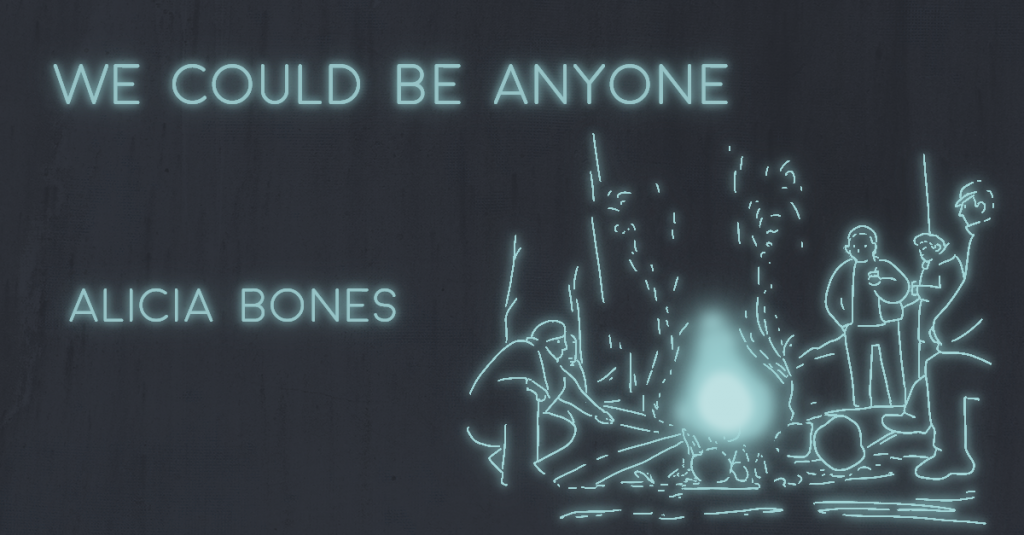I knew I should feel sympathy for Laura, but her fire-bright face in the Abernathy-Smythe backyard unsettled me. She was telling me the details of her life, the really private, personal ones, though we’d only met a few times at parties hosted by shared acquaintances.
“My father is a drunk, and my mother is sociopath,” Laura said, staring off into the fire.
Jesus Christ, was all I could think as I twisted up my fingers. I didn’t know what to say. I couldn’t even think of what I should say. I was well-adjusted, a truth about myself that had bothered me for years. My parents had always been appropriately-boundaried, so how could I relate?
“When my mother forgot my high school graduation, I cried for days,” Laura said with stage-direction movements: look left slim-lipped, look right.
I stopped myself from rolling my eyes. The confessions kept coming in cliched absurdity. They weren’t fireside dredging of deep-dark memories, either; Laura had told me the high school story twice before.
“I’ll never forget how our cat looked,” she went on, “after my sister ran over him with her car.”
I looked at her in alarm. I’d drifted for a second—and now a dead cat? Laura hadn’t asked me for my compassion. I’d planned for an easy night of talking about The Bachelor and Harold’s trip to Mexico. Instead, she’d foisted her dead cat onto me.
She was too much, no matter how polite and self-loathing I was, so I said, “I’ve got to pee.” I went inside and didn’t plan on coming back. Laura would forget I was gone; the night was chilly and someone else would sit next to her. That person would be as good a confessional as I had been.
I angrily poured myself another drink. Self-involvement was an epidemic.
Laura had exhausted me, but I had to make myself aggressively cheerful. This was a party, after all, a beginning-of-summer party thrown by Melinda and Janet Abernathy-Smythe. They were the first of my friends to buy a house with a backyard; most of us still rented. I wasn’t anywhere close to buying property, but I served my purpose at social functions anyway: providing amusing anecdotes about my hapless dating life.
Inside, party-goers held drinks and stood in corners. These were the friends I’d cobbled together in my childless, partner-free twenties for my childless, partner-free thirties. They weren’t the friends I’d wanted, but they were the friends I had. Here they were, speaking passionately about a television show, effusively commenting on the Abernathy-Smythes’ new cabinets, cooing over photos of Helen’s new dog. Without them, I would never receive compliments on my new haircuts or shoes; I would exclusively rely on my own judgment.
I glanced at the fire through the open door to the back patio. Laura was talking to someone else. I was sure she was telling them exactly what she’d told me. I hoped they could think of reasonable ways to respond to her.
I headed toward the ficus in the living room to chat with solitary Harold about Mexico. He’d liked the beaches and warm water and the food. Did he actually want to tell me, “The food was spicier than I thought it’d be!” or did he feel obligated to say it? I couldn’t tell. I asked him how much his trip to the Yucatan had cost, and he said, “Cheap!” I didn’t know how to make him tell the truth, but his daughter was starting college in the fall, so maybe he was mourning.
Sam joined us, and Harold asked her about her new house. I told her I was hoping to buy in her neighborhood. She looked with me with derision because she’d purchased the home with her husband, and I had no husband. She scoffed, “Good luck!” though she also smiled, like I was a pathetic child with an impossible wish. In fact, I had no strong feelings about her neighborhood and remained unsure if I had ever visited it.
Later, three drinks in and pouring myself a fourth, I talked to a new person in our group, a rare friend of a friend. For some reason, I told her about my nerves about commitment, about how I feared my life twenty years from now would look the same as it did now.
“Life always changes, whether you want it to or not,” Tammy said, making sincere eye contact. I felt real empathy from her and was surprised.
I was grateful that my sister had never killed our cat or that I’d never had the impulse to lie that she had. “If you say so,” I laughed.
Behind Tammy, I saw Laura through the kitchen window. She was talking to someone, maybe even a third person, though I could only see the back of their head. I should have been angry about the anonymous way Laura collected her self-aggrandizement, emptied her mind onto a held-captive acquaintance. Why could only some people have authentic exchanges; why did only some people want to?
I suddenly realized I had no idea which type of person I was.
In a moment of compassion, fueled by drink and goodwill towards Tammy, I felt sorry for Laura’s isolation, which was even more impenetrable than my own. Secrets were stand-ins for authenticity, but Laura didn’t understand that. She didn’t know why she failed to connect. My stomach lurched in customary empathy, but I suspected my feelings were only habitual, a knee-jerk reaction to a stimulus that could have come from anywhere.

